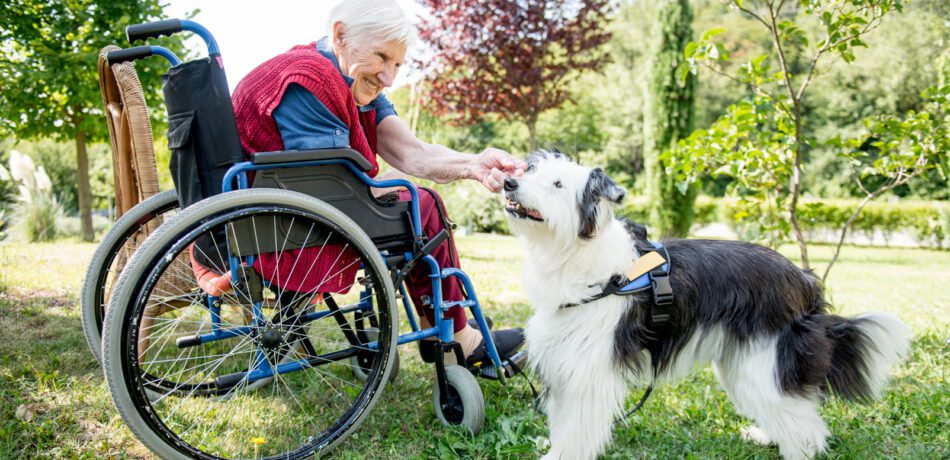Do you have physical limitations that make you feel unsafe at home or struggle to get tasks done? A service dog might be able to help. Around 500,000 service dogs help people every day in the United States. Here’s what to know about the different types of service and companion animals, and how to know whether you qualify for one.
On this page
Types of Service and Companion Animals
There are many different types of service animals. These include service dogs, emotional support animals and therapy animals.
Service Dogs
The Americans with Disabilities Act (ADA) defines service animals as “dogs that are individually trained to perform tasks for the benefit of an individual with a disability.” Dogs are the only animal that is legally considered a service animal. Other types of animals, like horses or cats, can only be therapy animals or emotional support animals.
A service dog might help with a disability that’s physical, sensory, psychiatric or intellectual. Many service dogs are trained to perform highly specific tasks. For example:
- Allergy detection dog
- Seizure dog
- Hearing dog
- Mobility assistance dog
- Psychiatric service dog
- Diabetic alert dog
- Autism service dog
- Guide dog
Each of these dogs is specially trained to help people with specific disabilities and needs. Although they live with you, they are considered working animals, not pets.
Emotional Support Animals
An emotional support animal (ESA) offers you emotional support. Dogs and cats are generally used as ESAs, and they do not need any special training.
There is a difference between a service dog and an emotional support animal. Under the ADA, service dogs are legally allowed to enter any public place with you. However, emotional support animals have more restrictions. ESAs are covered under the Fair Housing Act (meaning they can live with you even if your home has a no pets policy). But if a public place does not allow pets, your emotional support animal will have to wait outside.
The process of obtaining a service animal vs. an emotional support animal is different too. Being matched with a service dog is a rigorous, time-consuming and expensive process. However, you can turn any animal into an ESA with a signed letter from your mental health professional.
Therapy Animals
Therapy animals do not live in your home. Instead, you might work with one of these animals at a place like a hospital or rehab facility. Similar to a service dog, therapy animals are specially chosen and trained to perform the work that they do.
How to Know If You Qualify For A Service Animal
If you feel you would benefit from an emotional support animal, this process is fairly simple. You can adopt an animal or choose to have your current pet fill the role. Then you’ll need a medical recommendation letter from a mental health professional (like a licensed mental health counselor) stating that the animal helps you with your mental health condition.
Qualifying for a service dog, however, can be a little more complicated. Since matching someone with a service dog takes a lot of time, effort, and money for everyone involved, you don’t want to commit to this process unless you’re certain a service dog would be helpful to you.
Do You Have A Disability?
To qualify for a service dog, your disability needs to match the ADA definition of disability. According to the ADA, a person with a disability is someone who:
- has a physical or mental impairment that substantially limits one or more major life activities,
- has a history or record of such an impairment (such as cancer that is in remission), or
- is perceived by others as having such an impairment (such as a person who has scars from a severe burn).
Here are some examples of physical disabilities that service dogs can help with:
- Paralysis
- Multiple sclerosis
- Autism
- Epilepsy
- POTS
- Arthritis
- ALS
- Blindness
- Deafness
- Cerebral palsy
- Parkinson’s disease
- Muscular dystrophy
- Spinal cord injury
Here are some examples of mental disabilities that service dogs can help with:
- Depression
- Anxiety disorders
- Bipolar disorder
- Schizophrenia and psychotic disorders
- Attention Deficit Hyperactivity Disorder (ADHD)
- Addiction, substance abuse, and alcoholism
- PTSD and trauma
- OCD
- Dissociative and personality disorders
- Neurocognitive disorders
Could A Service Dog Help?
If you have a disability according to the ADA’s definition, the next step is to
seriously think about whether a service dog would help you. Since everyone has different needs, someone with a certain disability might benefit greatly from a service dog, while someone else with the same disability could be fine on their own.
For instance, maybe someone with epilepsy feels unsafe because of the frequency and unpredictability of their seizures. They might want a seizure dog who can alert them and help them get somewhere safe when a seizure is coming on.
But another person with epilepsy might not “need” a service dog because they spend most of their time at home and can also tell when they’re about to have a seizure.
In the end, it really comes down to your specific situation, needs, and preferences. It’s helpful to learn about different types of service dogs and what kind of tasks they do so you can better understand what a service animal might do for you.
Does Your Healthcare Provider Agree?
The final step to qualify for a service dog is to speak with your healthcare provider or other medical professional. Ask for their opinion on whether a service dog would help. If they agree, get documentation from them stating that your disability could be improved or supported by getting a service dog. Depending on where and how you get your service dog, you may not need this documentation, but it’s still a good idea to have.
How to Get A Service Dog
Some people train their service dog by themselves. But most people get a service dog that has already been trained. You can work with a professional service dog training organization (you’ll find both nonprofit and for-profit options) or individual. Training a service dog can cost over $25,000, but some organizations offer financial assistance.
Research your options and reach out to one that seems like a good fit. You will most likely have to apply. They’ll take over the approval and matching process from there.
Colonial Penn is here for you!
Colonial Penn has specialized in making life insurance simple and accessible by offering it directly to consumers since 1957. Click here to learn more.





